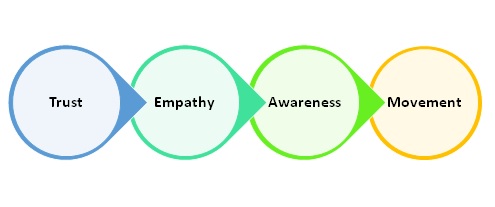A Coaching Model Created by Prasad Dandekar
(Life Coach, INDIA)
Introduction
International Coach Federation (ICF) defines coaching as “Coaching is a thought-provoking and creative partnership that inspires clients to maximize their personal and professional potential, often unlocking previously untapped sources of imagination, productivity and leadership”. It is a deep relationship that is built on the foundation of trust and empathy and is an essential part of transformative coaching. Both, the coach and coachee are a part of the team which is together exploring possibilities and finding solutions to move forward in the direction that the coachee has chosen. Each of these relationships is unique due to the uniqueness of the coachee, however, the foundations of trust and empathy are constant. The model I have proposed is about the coaching between an individual coachee and a coach and is not for coaching a team of people.
My Niche
I am an oncologist with a cumulative experience of nearly 26 years in the field of medicine. During these years I have had a rare opportunity to study not only the diseases that plague our bodies but their impact on our minds. Cancer patients face struggles at many levels and the diagnosis may impact their physical, psychological, emotional, social, spiritual, and sexual health. In addition, it may have an impact on their relationships, finances, career, self-worth and overall quality of life. It is a life-changing diagnosis and cancer patients are often forced to adapt to a “new normal” and that transition may not be easy for several patients. The diagnosis and the journey ahead also had a deep impact on the caregivers and both patients and caregivers need support to accept and deal with this reality. Many of them need counselling and therapy to deal with some of the issues, especially in the initial phase of diagnosis and treatment. Once they have accepted the reality and decided to move ahead, they would benefit from coaching. I am painfully aware of the void that exists in the support available for cancer patients and their caregivers and I want to work with them to help them to move forward in life and bloom instead of just survive.
My Influences
My life experiences have lead me on to this journey into coaching and there have been various influences that have empowered me with specific knowledge, skills, and attitudes for coaching. I am exploring some of my influences here.
My own father was detected with a brain tumour in the year 1999 and I have personally experienced the challenges that the patient and their family goes through. He underwent surgery, followed by Radiotherapy. While it kept the tumour under control, it had a significant impact on this physical, mental and emotional health. This gave me an up-close view of what does the patient and the family goes through for years on end. In retrospect, I regret not being able to help my father to come out of the gloom and move forward in his life. This is a very personal reason why I am so keen to be a coach to cancer patients.
I trained as an oncologist in India’s busiest cancer centre, Tata Memorial Hospital where I got to see up close the journey of thousands of cancer patients. My dissertation for my post-graduation was a project with terminally ill patients who were in severe pain. I worked very closely with those patients and their families, got to know their problems, needs and struggles. This was the most powerful training on trust, empathy, compassion, and resilience for me. My training in the UK also enabled me to see beyond the treatment of cancer. It made me aware that the patients are not just looking for solving the current problem, but they are also looking forward and trying to cope with life. This training helped me to see a patient as a whole and not just an illness that needs to be cured.
This increased awareness about what patients need beyond cancer care encouraged me to get trained as a counsellor. While coaching and counselling are very different, the basic key attitudes employed in counselling are relevant to coaching too. It helped me to develop unconditional positive regard for the client, authenticity, being present for the client, and empathy instead of sympathy. This experience has helped me to build a strong foundation for a coaching relationship.
My own life experiences as an out gay man in India have empowered me to shift my perspective about adversity and move forward in the direction that I chose. Self-acceptance, courage to assert my individuality, developing awareness about my mission, values and vision have been enablers in my journey as a coach.
Model:
My coaching model is called TEAM. It highlights that the coach and coachee are a part of a team working on the goal set by the coachee. TEAM stands for;
T – Trust
E – Empathy
A – Awareness
M – Movement
Trust:
Coaching is a partnership that begins with trust. In a coaching relationship, trust is a feeling of confidence and security that a coachee feels. Trust is created by a set of behaviours that create a belief in a probability that the coach will behave in a certain way and be dependable. Both, verbal as well as non-verbal cues contribute to creating trust in a coaching relationship. Only in a trusting space, strong emotional connections can be formed which enable powerful growth.
When a client, who could be a cancer patient or a caregiver, comes in the coaching session with a problem, I trust in their full potential to solve their own problems. Many of the clients may come with strong beliefs which may be sometimes non-scientific, against the evidence and based on their own experiences. I support them by creating a non-judgemental space in the coaching session by acknowledging their beliefs and inviting them to analyse how those beliefs are serving them. Diagnosis and treatment of cancer are life-changing events, and the clients have already done a lot of physical and emotional work in this process. I acknowledge their contribution to the coaching process and express my support for them. In the coaching session, creating this trust allows my clients to express themselves fully, leading to deeper introspection and more creative solutions to their problems.
I trust not only in the client’s capability to solve their problems but also in my own capability to be adequate to coach the client. This empowers me to have humility in asking powerful questions, be patient when the client is struggling for answers, and not lead the client in a particular direction.
Empathy:
Empathy is the ability to sense other people’s emotions, coupled with the ability to imagine what someone else might be thinking or feeling. There are three types of empathy. Cognitive empathy is about understanding what others are thinking, emotional about what they are feeling, and empathetic concern is about understanding what they might need from you. In the coaching process, the coach needs to deploy all three to move the client forward in the direction of the goal that the client has chosen.
Having been through my father’s illness and seeing thousands of patients over the last 20 years, I have seen the struggle of the cancer patients up close. This has empowered me to understand their point of view and be empathetic. Having an understanding of their thinking, feeling, and needs helps me to explore what the client wants to achieve in the coaching session and establish a coaching goal. Being present for the client by being observant, responsive, curious and noticing their energy shifts, leads to better understand the client’s point of view. One of the most important aspects of the coaching process is powerful questioning which requires empathy to understand clients frame of reference and learning style. Once the client has come up with an action plan, making the client accountable for it through an empathetic and pragmatic approach is key for the client to achieve the results. I use empathy not only to understand the client but also their context, environment and worldview too.
Awareness:
Coaching is a thought-provoking process that helps the client to gain awareness about their thoughts, beliefs, emotions, behaviours, and external factors. Using trust and empathy, I can create a safe space for the client to reflect and explore. Many cancer patients are experiencing a lot of emotions related to their health and future. Coaching helps them to gain some awareness about their thinking, limiting beliefs and emotions. Awareness comes as a product of being present for the client, active listening, powerful questioning, and direct communication. Being present allows me to listen to the who of the client along with what the client wants to resolve. by reflecting on my observations and intuitions, I can make the client generate awareness.
I am aware of my own beliefs, biases, and emotions. I have the awareness when the clients’ thoughts or behaviour is not in alignment with my beliefs, especially beliefs that go against my knowledge as an oncologist. This awareness empowers me to strengthen my empathy and be in alignment with the client and move them in the direction of the goal they have chosen.
Movement:
The ultimate goal of the coaching is to move the client in the direction that they have chosen. The awareness that the client gains in the session help them to plan action. I help them explore to create a detailed action plan. We explore what would they like to do and when. I go into details of what are will help them to achieve their goal and what could be their hurdles. For many clients taking the first step towards their goal can be daunting and hence I explore what would be the next small step that they can take in that direction. Through direct communication, I explore the commitment of the client and make them accountable for the action plan that they have come up with. I send a detailed dossier after the coaching session to my clients which gives them a reference to look back for the awareness or insights they have gained, actions planned and available resources.
Conclusion
Cancer patients are a vulnerable group of clients. They are not only battling a physical disease but also dealing with a lot of emotional, social, financial, sexual, spiritual, and existential battles. It is critical for this group that the coach is trusting, understands their world view and is moving with them in the direction and speed with which they are comfortable. I have been able to move my clients by creating that safe space for them and being there with them in this difficult journey.
